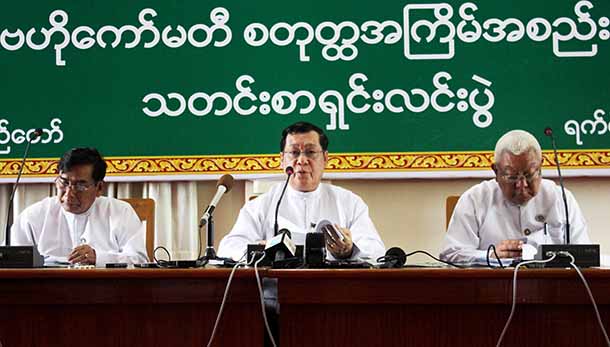NAYPYIDAW — Parliament Speaker Shwe Mann will remain chairman of the Union Solidarity and Development Party (USDP), leading the ruling party into elections later this year.
Following a three-day Central Executive Committee meeting in Naypyidaw, the USDP announced on Sunday that the Speaker would maintain his position atop unchanged party leadership.
The committee was expected to discuss its strategy for the upcoming general election and settle on candidates for constituencies nationwide.
USDP General Secretary Thein Swe told reporters that Shwe Mann will head the party’s Elections Winning Committee. Whether he will be backed as a presidential candidate will ultimately depend on election outcomes, but Thein Swe showed some degree of confidence in incumbent President Thein Sein, stating that he might receive the party’s support if he seeks re-election.
“It depends on the party’s decision. The party’s conference can resolve that issue,” Thein Swe said in response to a question posed by The Irrawaddy.
“Until we hold the 2015 elections, [Shwe Mann] will be president of the elections committee,” Thein Swe said, dispelling misguided speculations that Thein Sein would take the role, which would contravene the Constitution. Upon taking office, the president and Union ministers are prohibited from taking part in party activities.
Thein Swe said the party has not yet decided on all of its candidates and will try to release more detailed information about its election strategy within the next two weeks.
The party expects to face more challenges than in previous elections, the secretary said, because of the growing influence of ethnic parties in Burma’s outlying states and the rise of the main opposition National League for Democracy (NLD) in Bamar-majority divisions.
Elections for Union and regional legislatures are expected to be held in early November, the first such nationwide polls since 2010. Burma’s 2010 election was boycotted by the NLD and largely considered fraudulent. By-elections held in April 2012 were viewed as more credible, with the opposition winning 43 contested seats.
Burma’s presidency is determined by a vote of the Union Parliament, which serves as the nation’s electoral college. The Parliament elected in November will assume office on January 30, 2016, and the electoral college is set to convene in early February.
Three presidential candidates will be nominated by the college and later put to vote—two selected by elected lawmakers and one by the military’s 25 percent bloc in the legislature. The two unsuccessful candidates will be appointed as vice-presidents.
Additional reporting contributed by Tun Tun.
















